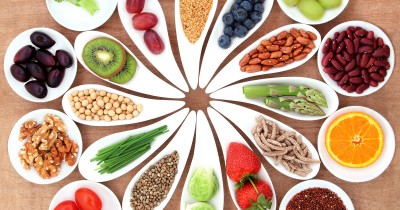Top Foods That Fight Inflammation
By Meg Pulkrabek MS, RD, LRD
As uncomfortable and painful as inflammation can be, the sensation is actually a sign that your body is attempting to heal itself. When you feel swelling to an injured area, it means there has been blood and proteins sent in to repair the injury. The materials that accompany your blood are white blood cells, hormones, and nutrients that support immunity, protection, and healing.
But did you know that inflammation also occurs on the inside of your body? You can’t see or feel it, but internal inflammation can result from poor diet and exercise habits as well as stress, lack of sleep, allergies, smoking, and pollution. Being in a long-term or chronic inflammatory state can result in negative health effects such as heart disease, diabetes, cancer, arthritis, and more.

So what foods can you eat to heal your body from the inside? Try these anti-inflammatory foods!
Salmon, chia seed, flaxseed, walnuts, bone broth, and tuna
Omega-3 fatty acids send signals to enzymes and hormones to block inflammation pathways inside of a cell. Another proposed mechanism is that Omega-3 may send messages to receptors that regulate hormones that reduce inflammation.
Green leafy vegetables
Examples like spinach and kale are good sources of vitamin K, which helps regulate our blood clotting and calcification. Vitamin K also helps to inhibit pro-inflammatory monocytes.
Bok Choy
Bok Choy contains flavonoids called quercetin, kaempferol, and isorhamnetin which inhibit pro inflammatory mediators and adhesion molecules. Bok Choy also contains numerous phenolic acids that inhibit the production of inflammatory cytokines and suppress the activity of inflammation signaling pathways. Bok Choy also contains vitamin K and omega 3.
Celery
Celery decreases multiple inflammation markers including: tumor necrosis factor alpha, nuclear factor kappa and cytokines.
Broccoli
Isothiocyanates, the compounds made from glucosinolates found in broccoli and other cruciferous vegetables, actually help to shut down components of the inflammatory system. Broccoli is also a rich source of kaempferol, which has the ability to lessen the impact of allergy-related substances that may cause inflammation.
Turmeric
Turmeric may decrease production of inflammatory cytokines and assists in cell signaling and messaging to decrease inflammation.
Ginger
Ginger has been used for centuries to reduce inflammation and treat inflammatory conditions, especially arthritis. Ginger contains gingerols, which inhibit production of nitric oxide that creates free radicals. Ginger also suppresses cytokine and chemokine production.
Cucumber
Cucumber inhibits the activity of pro-inflammatory enzymes like cyclo-oxygenase 2, and by preventing overproduction of nitric oxide in situations where it could increase the likelihood of excessive inflammation.
Sweet Potato
Anthocyanin and other color-related pigments in sweet potato decreasing activation of pro-inflammatory enzymes. Also, sweet potato intake may decrease fibrinogen levels, which can trigger pro-inflammatory molecules like cytokines.
Pineapple
The enzyme bromelain found in pineapple may help to reduce swelling, bruising, healing time, and pain. Bromelain is currently being used to treat and reduce inflammation from tendinitis, sprains, strains, and other minor muscle injuries as well as swelling related to ear, nose and throat surgeries or trauma.
Watermelon, Chickpea, Beets
These items contain choline, which assists in reducing several inflammatory biomarkers including C-reactive proteins, homocysteine, interleukin-6, and tumor necrosis factor.






